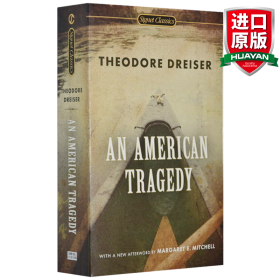
英文原版 An American Tragedy 美国悲剧 蓝思1240L Signet Classics 英文版 进口英语原版书籍
书籍内容简介可联系客服查阅,查书找书开票同样可以联系客服
¥ 48 ¥ 48 九五品
库存39件
广东广州
认证卖家担保交易快速发货售后保障
作者Dreiser, Theodore
出版社Signet Classics (MM)
ISBN9780451531551
出版时间2010-08
装帧其他
定价48元
货号YB-894
上书时间2024-03-17
- 最新上架
商品详情
- 品相描述:九五品
- 商品描述
-
内容摘要
书名:An American Tragedy 美国悲剧 难度:Lexile蓝思阅读指数1170L 作者:Theodore Dreiser西奥多·德莱塞 出版社名称:Signet Classics 出版时间:2010 语种:英文 ISBN:9780451531551 商品尺寸:10.6 x3.8 x 17.3 cm 包装:简装 页数:896 二十世纪美国文学扛鼎之作之一 诺贝尔文学奖获得者赛珍珠极力推崇 An American Tragedy《美国悲剧》发表于1925年,是西奥多·德莱塞的代表作之一,小说以一个普通美国青年克莱德·格里菲斯短促的一生为线索,描写了他受到社会上邪恶影响,逐渐蜕变、堕落为凶杀犯、后来自我毁灭的全过程。小说将美国现代社会生活的众多画面交织进去,反映了美国社会的现实,发人深省。 电影A Place in the Sun《郎心似铁》(也译作《阳光照耀之地》)根据An American Tragedy《美国悲剧》改编,由伊丽莎白·泰勒和蒙哥马利·克利夫特主演,赢得了六项奥斯卡金像奖。 本书为Signet Classics推出的英文原版,由Richard Lingeman作序,Margaret E. Mitchell后记,内容完整无删减,书本小巧便携。 An American Masterpiece Clyde Griffiths finds his social-climbing aspirations and love for a rich and beautiful debutante threatened when his lower-class pregnant girlfriend gives him an ultimatum. Extraordinary in scope and power, vivid in its sense of wholesale human waste, increasing in its rich, compassion,An American Tragedy stands onTheodore Dreiser’s supreme achievement. Based on an actual criminal case,An American Tragedy was the inspiration for the film A Place in the Sun, which won six Academy Awardsand starred Elizabeth Taylor andMontgomery Clift. With an Introduction byRichard Lingeman and a new Afterword byMargaret E. Mitchell An American Tragedy《美国悲剧》的主人公克莱德生长在一个先是笃信宗教、后来贫穷得不得不以宗教为生的非宗教从业人士家庭里。他自幼被父母逼着为了生计在街头抛头露面宣传他父母所笃信的上帝,可是贫穷低贱的克莱德却有一个雄心勃勃的美国梦。他一心向爬,纵情于酒色和物质享受。克莱德让一个地位比他更低微的姑娘怀上了孩子,可是他不愿意娶她,一是因为她会是他的累赘,二是因为这时恰巧有一个上层社会的小姐爱上了他,可以让他摆脱贫贱,一步登天。于是克莱德设计谋杀了善良无辜的穷姑娘。但是克莱德落入了法网,他被处以死刑。上帝没能救得了他,他的父母却仍在贬斥世俗的物欲,颂扬上帝的仁慈。美国梦是耶非耶?上帝仁耶忍耶?作者也未能说明究竟何为美国悲剧。 An American Tragedy is the story of Clyde Griffiths, who spends his life in the desperate pursuit of success. On a deeper, more profound level, it is the masterful portrayal of the society whose values both shape Clyde’s ambitions and seal his fate, it is an unsurpassed depiction of the harsh realities of American life and of the dark side of the American dream. 西奥多·德莱塞(1871—1945),美国文学史上杰出的现实主义小说家,一位以探索充满磨难的现实生活著称的美国自然主义作家。他的作品贴近广大人民的生活,诚实、大胆、充满了生活的激情。其代表作品有《嘉莉妹妹》《美国悲剧》《天才》等。 Theodore Dreiser was born in Terre Haute, Indiana, on August 27, 1871. After a poor and difficult childhood, Dreiser broke into newspaper work in Chicago in 1892. A successful career as a magazine writer in New York during the late 1890s was followed by his first novel, Sister Carrie (1900). When this work made little impact, Dreiser published no fiction until Jennie Gerhardt in 1911. There then followed a decade and a half of major work in a number of literary forms, which was capped in 1925 by An American Tragedy, a novel that brought him universal acclaim. Dreiser was increasingly preoccupied by philosophical and political issues during the last two decades of his life. He died in Los Angeles on December 28, 1945. And the tall walls of the commercial heart of an American city of perhaps 400,000 inhabitants—such walls as in time may linger as a mere fable. And up the broad street, now comparatively hushed, a little band of six,—a man of about fifty, short, stout, with bushy hair protruding from under a round black felt hat, a most unimportant- looking person, who carried a small portable organ such as is customarily used by street preachers and singers. And with him a woman perhaps five years his junior, taller, not so broad, but solid of frame and vigorous, very plain in face and dress, and yet not homely, leading with one hand a small boy of seven and in the other carrying a Bible and several hymn books. With these three, but walking independently behind, was a girl of fifteen, a boy of twelve and another girl of nine, all following obediently, but not too enthusiastically, in the wake of the others. It was hot, yet with a sweet languor about it all. Crossing at right angles the great thoroughfare on which they walked, was a second canyon-like way, threaded by throngs and vehicles and various lines of cars which clanged their bells and made such progress as they might amid swiftly moving streams of traffic. Yet the little group seemed unconscious of anything save a set purpose to make its way between the contending lines of traffic and pedestrians which flowed by them. Having reached an intersection this side of the second principal thoroughfare—really just an alley between two tall structures—now quite bare of life of any kind, the man put down the organ, which the woman immediately opened, setting up a music rack upon which she placed a wide flat hymn book. Then handing the Bible to the man, she fell back in line with him, while the twelve-year-old boy put down a small camp-stool in front of the organ. The man—the father, as he chanced to be—looked about him with seeming wide-eyed assurance, and announced, without appearing to care whether he had any auditors or not: “We will first sing a hymn of praise, so that any who may wish to acknowledge the Lord may join us. Will you oblige, Hester?”At this the eldest girl, who until now had attempted to appear as unconscious and unaffected as possible, bestowed her rather slim and as yet undeveloped figure upon the camp chair and turned the leaves of the hymnbook, pumping the organ while her mother observed: “I should think it might be nice to sing twenty-seven tonight— ‘How Sweet the Balm of Jesus’ Love.’” By this time various homeward-bound individuals of diverse grades and walks of life, noticing the small group disposing itself in this fashion, hesitated for a moment to eye them askance or paused to ascertain the character of their work. This hesitancy, construed by the man apparently to constitute attention, however mobile, was seized upon by him and he began addressing them as though they were specifically here to hear him. “Let us all sing twenty-seven, then—‘How Sweet the Balm of Jesus’ Love.’” At this the young girl began to interpret the melody upon the organ, emitting a thin though correct strain, at the same time joining her rather high soprano with that of her mother, together with the rather dubious baritone of the father. The other children piped weakly along, the boy and girl having taken hymn books from the small pile stacked upon the organ. As they sang, this nondescript and indifferent street audience gazed, held by the peculiarity of such an unimportant-looking family publicly raising its collective voice against the vast skepticism and apathy of life. Some were interested or moved sympathetically by the rather tame and inadequate figure of the girl at the organ, others by the impractical and materially inefficient texture of the father, whose weak blue eyes and rather flabby but poorly-clothed figure bespoke more of failure than anything else. Of the group the mother alone stood out as having that force and determination which, however blind or erroneous, makes for self-preservation, if not success in life. She, more than any of the others, stood up with an ignorant, yet somehow respectable air of conviction. If you had watched her, her hymn book dropped to her side, her glance directed straight before her into space, you would have said: “Well, here is one who, whatever her defects, probably does what she believes as nearly as possible.” A kind of hard, fighting faith in the wisdom and mercy of that definite overruling and watchful power which she proclaimed, was written in her every feature and gesture. “The love of Jesus saves me whole, The love of God my steps control,” she sang resonantly, if slightly nasally, between the towering walls of the adjacent buildings. The boy moved restlessly from one foot to the other, keeping his eyes down, and for the most part only half singing. A tall and as yet slight figure, surmounted by an interesting head and face—white skin, dark hair—he seemed more keenly observant and decidedly more sensitive than most of the others—appeared indeed to resent and even to suffer from the position in which he found himself. Plainly pagan rather than religious, life interested him, although as yet he was not fully aware of this. All that could be truly said of him now was that there was no definite appeal in all this for him. He was too young, his mind much too responsive to phases of beauty and pleasure which had little, if anything, to do with the remote and cloudy romance which swayed the minds of his mother and father. 1234567
— 没有更多了 —




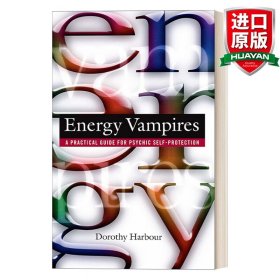

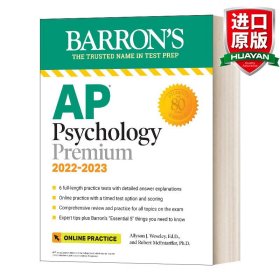
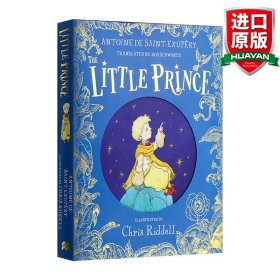
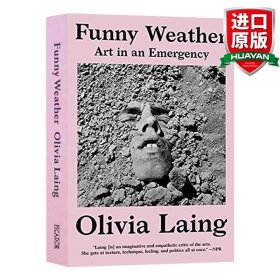



以下为对购买帮助不大的评价